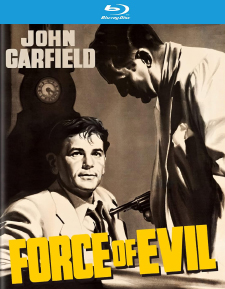Force of Evil (Blu-ray Review)

Director
Abraham PolonskyRelease Date(s)
1948 (August 1, 2023)Studio(s)
The Enterprise Studios/MGM (Kino Lorber Studio Classics)- Film/Program Grade: A
- Video Grade: A
- Audio Grade: A-
- Extras Grade: A-
Review
Unquestionably in the top tier of great film noir, Force of Evil (1948) is a crime story with a strong socio-political undercurrent, with a screenplay by its director, Abraham Polonsky, full of stylized, almost poetic dialogue and further bolstered by great acting. Producer-star John Garfield is expectedly superb, but the real surprise is many of the supporting performances, by actors like Thomas Gomez, Marie Windsor, and Roy Roberts, all of whom were never better.
The picture was not the financial success Garfield and Polonsky’s earlier collaboration, Body and Soul (1947), had been, and soon after both men would have their careers shut down by the Blacklist. Polonsky wouldn’t direct another movie until Tell Them Willie Boy Is Here in 1969. First called to testify before HUAC in 1951, Garfield squeezed out four more films after Force of Evil, but the stress of being blacklisted must have contributed to his sudden death by heart attack in 1952. Garfield was only 39.
Joe Morse (Garfield) is an attorney for racketeer Ben Tucker (Roy Roberts). Blindly ambitious, he surrenders his legal distance from Tucker’s crimes by hatching a scheme certain to make millions. He’s aware that on the upcoming Fourth of July holiday, many suckers invariably pick “776” in the lotteries Tucker fixes. Joe’s plan is the opposite of what one might expect: fix the lottery so that the winning number is 776. This would instantly bankrupt all the small-time numbers “banks,” allowing Tucker to swoop in and take control.
However, Joe’s long-estranged brother, Leo (Thomas Gomez), runs one of these small potatoes numbers rackets. Joe convinces Tucker to let him tip Leo off and, further, to consolidate all the bankrupt operations under Leo’s back room business, something guaranteed to also make Leo rich as well. This becomes a problem when intrinsically honest Leo adamantly refuses to play along. The numbers racket might be dishonest, but he plays as fair and square with his customers as a small-town grocer. Further, he’s genuinely paternal toward his staff, especially his longtime secretary, Doris Lowry (Beatrice Pearson), whom he regards as a surrogate daughter.
To save Leo from bankruptcy, the same elder brother who scrimped and saved to send him to law school, Joe has Leo’s “bank” raided by the police, so that it will be closed when “776” hits. The entire staff is arrested, and when Tucker’s gorillas move in for the takeover, everyone’s ready to quit. But meek bookkeeper Freddy Bauer (Howland Chamberlain) can’t quit—he knows too much about the operation’s finances to walk away. Elsewhere, another old-time gangster, Ficco (Paul Fix), uses his man Wally (Stanley Prager) to further intimidate Bauer, part of a scheme to force some kind of partnership on Tucker.
The heart of the film is the contentious character relationship between Joe and Leo, the latter driven to penny-ante “semi-legit” crime because he found it impossible to get ahead working completely legitimately. Forced into the numbers racket, he tempers his guilt by treating his customers fairly, and his staff like members of an extended family. Leo cares far more about what will happen to his employees than any money he might personally make.
Conversely, gangster like Tucker roll over everyone like a bulldozer. Employees are mere means to an end; the first time they get out of line, bump ‘em off. Yet where Leo hides his “bank” away in dark, shabby little rooms in the slums, Tucker is a gangster out in the open, flaunting his wealth and power in big offices on Wall Street. (The casting of Roberts helps this; he usually played respected bank presidents and government officials.) Instead, it’s bug-eyed, fat and sweaty Thomas Gomez, who specialized playing sweaty, slimy villains, who gets all the empathy, while handsome, smooth-talking John Garfield’s lawyer does the far greater harm—giving high-stakes gangsters the appearance of legitimacy, while causing the far greater social harm.
Joe’s relationship with Doris is written more conventionally. She’s there mainly to act as Joe’s conscience, playing the Devil’s Advocate questioning Joe’s motives while through Doris he’s looking for some kind of moral redemption. Nevertheless, the poetic dialogue raises even these scenes to way above average.
In so authentically demonstrating how the numbers racket really works (at least in late-1940s terms), Force of Evil does become a little confusing, especially since its premise involves turning its well-oiled machine upside-down with its lottery scheme. Noir like The House on 92nd Street gave birth to police procedural pictures that explicitly showed how things worked from the law enforcement side of things. Rare up to then was a movie that showed the criminal process in such authentic detail. Director Martin Scorsese, who provides a glowing introduction (shot, probably, in the 1990s) and was clearly impressed—his film GoodFellas (1990) likewise dramatizes exactly how low- and mid-level gangsters made their ill-gotten gains.
Though originally released through MGM, Force of Evil changed hands through the years, the title currently owned by Paramount. Kino’s Blu-ray sources a 2022 restoration in 4K by Paramount, the UCLA Film & Television Archive, and The Film Foundation. The black-and-white, 1.37:1 standard image is very impressive, top-tier for a late ‘40s black-and-white title. The DTS-HD Master Audio (2.0 mono) is also very good, and supported by optional English subtitles. Region “A” encoded.
Besides the repurposed but still valuable introduction by Scorsese, this release includes an excellent audio commentary track by the always thorough Imogen Sara Smith, one of the best commentators working these days. Not listed on the packaging but also included is a bland MGM trailer, one that really doesn’t know how to sell the picture.
Force of Evil is must-see film noir, a picture as relevant in 2023 as it was in 1948, and this release does it justice.
- Stuart Galbraith IV

